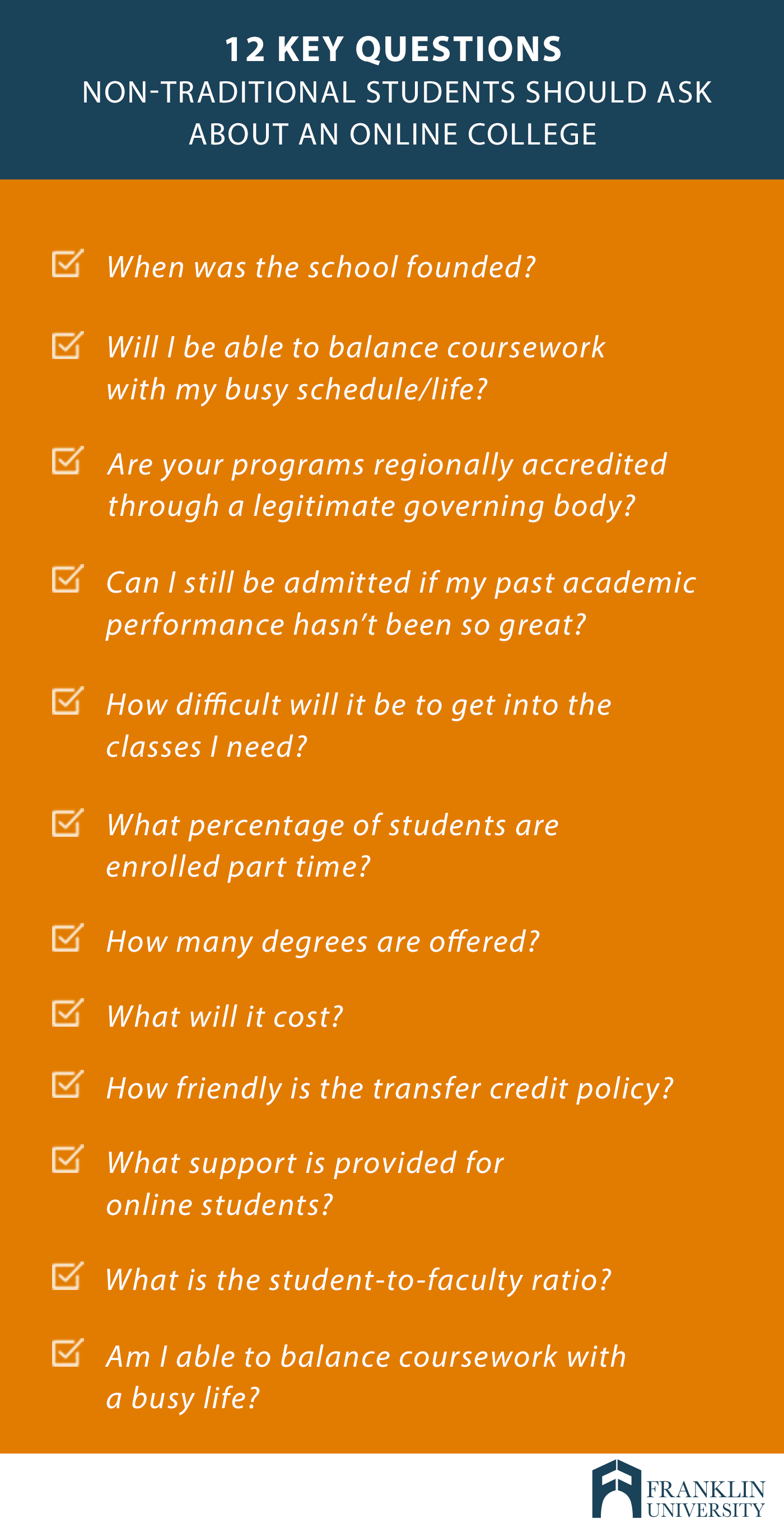Request Information
We're Sorry
There was an unexpected error with the form (your web browser was unable to retrieve some required data from our servers). This kind of error may occur if you have temporarily lost your internet connection. If you're able to verify that your internet connection is stable and the error persists, the Franklin University Help Desk is available to assist you at helpdesk@franklin.edu, 614.947.6682 (local), or 1.866.435.7006 (toll free).
Just a moment while we process your submission.

2018 Guide To The Best Online Colleges in Ohio
Online education in Ohio is booming.
To date, more than 200 Ohio institutions offer online programs for undergraduate degrees. It can be overwhelming to compare these programs against each other.
Who We Included in Our List
While many list sites are out there that rank all programs against each other, we wanted to examine Ohio’s online schools from a different perspective. Our goal was to find the most enticing programs from the perspective of an adult learner who is going back to school—either to finish a degree, earn a second bachelor’s, or pursue a bachelor’s for the first time.
We combed through the 200 institutions to find only the schools that meet the following criteria:
- 4-year schools
- Offer more than 5 online bachelor's programs
- 100% online
Not included in our list are specialty schools (including nursing programs, art schools, and seminaries), for-profit national organizations (such as University of Phoenix and Capella University), and associates-only programs (such as community colleges and vocational programs).
Comparing the Top Online Schools in Ohio for Busy, Working Adults
The table below represents the 13 best colleges in Ohio for adults who are considering going back to school to earn a degree. The table compares schools through two key criteria:
- Student Population: How will I fit in with the age and structure of the current student body?
- Format & Structure: How easy will it be to fit the courses I need into my schedule?
| % Students Over 25 | % Part-time Students | % Transfer Students | # Bachelor's Degrees Online (1) | |
| Bowling Green State University | 6% | 11% | 4% | 8 |
| Franklin University | 81% | 69% | 20% | 32 |
| Kent State University | 11% | 46% | 5% | 9 |
| Malone University | 13% | 76% | 4% | 6 |
| Mount Vernon Nazarene University | 22% | 21% | 3% | 7 |
| Notre Dame College | 17% | 30% | 8% | 7 |
| Ohio Christian University | 65% | 39% | 5% | 14 |
| Ohio University | 7% | 9% | 7% | 9 |
| Tiffin University | 25% | 21% | 9% | 17 |
| Union Institute & University | 93% | 47% | 31% | 14 |
| University of Northwestern Ohio | 10% | 7% | 8% | 26 |
| Ohio University of Toledo | 14% | 19% | 6% | 7 |
| Youngstown University | 16% | 22% | 5% | 6 |
(1) Reflects number of bachelor's programs that were offered and completed 100% online. Sources: National Center For Education Statistics 2016-2017, US News & World Report & Individual School websites
It’s recommended to find a program that is tailored specifically to working adults, and not to settle for a program that offers online options. Thoughtfully mapped programs made for adults will provide additional resources and options to help you complete your degree as fast as possible. Flexible course options are designed to work around your lifestyle and daily schedule.
Narrowing Down the List: 12 Key Questions to Ask Before Choosing A Program
So, how do you find the best online program from the list above? We’ve come up with 11 key questions you should use to weigh if a program is the best fit for your goals and your lifestyle.

Ask: When was the school founded?
Why It Matters: Many colleges offering online degrees have been around, in the physical learning space, before the dawn of the internet. A school’s historical standing (i.e., its reputation) is just as important as how long they’ve been offering web-based courses. An online school with no brick and mortar history can be a warning sign. You want to ensure that the college has a long-standing tradition of educating students, no matter the platform for learning.
Ask: Is the school regionally accredited?
Why It Matters: What is accreditation and what does it mean for a school? Accreditation is the process in which a higher education institution is evaluated. While different types of accreditation exist (both national and regional), every type of accreditation must have a set of standards previously agreed upon by a peer board from other accredited colleges and universities. Never consider attending a school that is not accredited. These degrees come with a higher price tag and will never be recognized by the professional world or by another institution that is accredited themselves. It is also important to note, financial aid is not offered if you choose a non-accredited institution.
It’s easy to think that a national accreditation equates to a big, prestigious endorsement, but it’s the exact opposite. Nationally accredited schools are generally for-profit. For-profit schools are exactly as they sound. Their primary goal is to make a profit—not to advance higher learning. When choosing a program, opt for a public or nonprofit school that’s regionally accredited.
Ask: Can I still be admitted if my performance as a student hasn’t been so great?
Why It Matters: Different colleges and universities have different admission policies. Some may only accept 32 percent of their applicants in a given year, while others have a rolling or open policy. While it may seem prestigious to be accepted into a school that only admits less than half of those who apply, consider how you look on paper. Are you a non-traditional student who has been out of the game for a while? Were your grades in high school sub-par? Maybe your grades were great, but your standardized test scores were not-so-hot. A school that has a more open admission policy can be beneficial for those who are talented but don’t shine in an application alone.
When it comes to paying for school, grants are among your best options. But do you know how to find them? Remove the guesswork by downloading this free guide
Ask: What is the student-to-faculty ratio?
Why It Matters: Large schools can sometimes offer more degree options, a bigger, more diverse faculty to learn from, and more career/alumni networking resources. However, it’s important to assess how large classes are, who’s teaching, how long it will take to graduate, and what the student demographic looks like.
For example, a large state school may have over 50,000 undergraduate students. This may be attractive to you, but not if the student-to-faculty ratio is 20 to 1. The lower the ratio, the higher the likelihood for more personalized attention (be it online or in-person) from your professor. A professor with less students may be more likely to respond to emails faster or have more flexible physical or virtual office hours. Also, be sure to ask who teaches. It’s not uncommon for a teaching assistant to do most of the instructing in large, undergraduate courses. If you’re paying for tuition, you should be learning from someone with a terminal degree and the experience to back it up.
Ask: How difficult will it be to get into the classes I need to take?
Why It Matters: Also ask yourself if the size of the school will impact your ability to graduate on-time. Will you be able to get into the courses you need to take? Are there options to spread the degree out beyond the non-traditional 2 or 4-year track? What about fast-track learning? Does the school offer accelerated courses? What about summer classes? Can you learn year-round?
Ask: Are the majority of your students enrolled part-time?
Why It Matters: If you’re a non-traditional student, it’s also important to take note of the enrollment break-down. For example, a school with 91% full-time and 9% part-time students probably isn’t the best option for someone who is working full or part-time while going to school and balancing family life. Ensuring that the online program you choose can accommodate different lifestyles is key. Colleges and universities who cater to a greater student demographic will be mindful of designing a curriculum that supports consistent, manageable learning units. They will also be sure to communicate clear expectations and work deadlines, so you can plan ahead for work and personal commitments.
Ask: How many degrees are offered?
Why It Matters: If you know exactly what you need and want, then a school that only offers a handful of options (yours included) might not be bad choice. On the flip side, if you want the flexibility to modify the focus of your degree—or to continue on to a more advanced degree—then it’s important to choose an online program that has more to offer.
Ask: What will it cost?
Why It Matters: Cost is also important to consider. While the cheapest option can sometimes be the most attractive, be sure the school can offer at least some of the other benefits we’ve reviewed above. Additionally, the most expensive school doesn’t necessarily mean you’re getting the best-of-the-best. And when you graduate, will you be able to get a high enough paying job to pay off the student loans accrued to while earning your degree? It’s a catch-22.
Ask: How friendly is the transfer credit policy?
Why It Matters: Speaking of student loans, one of the best ways to tackle student debt is to complete your degree in a timely manner. That being said, if you choose an online degree program that doesn’t recognize all or some of the credits earned from prior academic work, you’re at a loss. Literally. Be sure to review the school’s transfer credit policy and have them evaluate your transcripts prior to enrolling—so as to avoid any surprises.
Ask: What support is provided for distance learning students?
Why It Matters: Lastly, if you’re going to attend an online college, thoughtfully developed curriculum, technical support options, and user-friendly interactive modules will make or break your experience. Say you have a technical support question after 5 p.m., does the school offer live chat or an after-hours phone resource? Or will you have to send an email that gets lost in a black hole for 5 days? How beneficial are the school’s tech support options if you plan on completing most of your coursework outside of business hours? Ask to demo the school’s online learning portal. Review textbooks or e-books. Are there message boards, interactive chat rooms, or video conferences? How will these components impact your distance learning experience? Make note, not all online programs are created equal. If it seems like it’s lacking in a strategic, student-friendly design, then you’re most likely spot on.
Ask: How large is the school’s endowment fund?
Why It Matters: A school’s endowment is also an important factor to consider. Nonprofit schools rely heavily on monies—or other financial assets—that are donated or meant be invested in order to grow principal for future needs the school may have. The larger the endowment, the better the facilities, faculty, learning resources, scholarships, and alumni/career networking. A for-profit school will never have an endowment.
Why Franklin is the Best Online School in Ohio
Designed exclusively for busy and working adults, Franklin University offers the non-traditional student the best online learning option.
Why are we able to say this with confidence? Consider what Franklin offers: Benefits of Attending Franklin University
- 59 online bachelor’s, master’s, and doctoral programs
- 36 online bachelor’s degrees
- 12 online master’s degrees
- A student population with an average age of 34 years old
- Transfer credit awarded for life experience
- Generous transfer policies help maximize previous education and work experience
- Proprietary online learning module (BlueQuill)
- Flexible and alternative scheduling to help adults learn at their own pace
If you’re looking to earn a degree online, it’s important to find a program that offers a quality degree, in a supportive environment, in a format that helps you succeed. That’s why Franklin University is the first choice in schools for busy, working adults.





